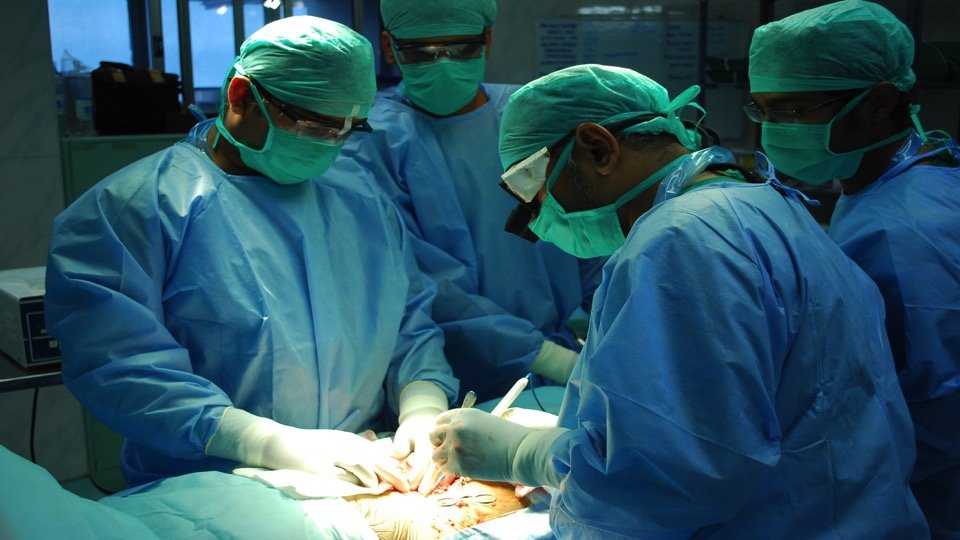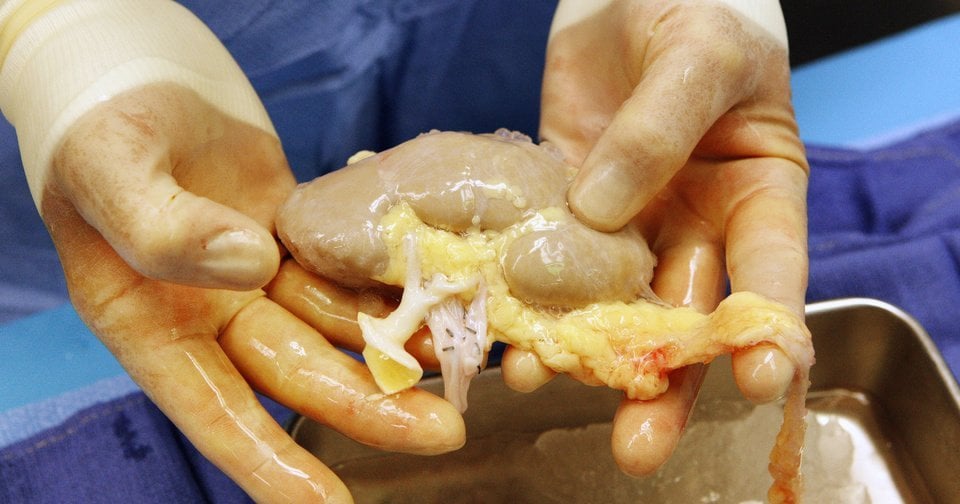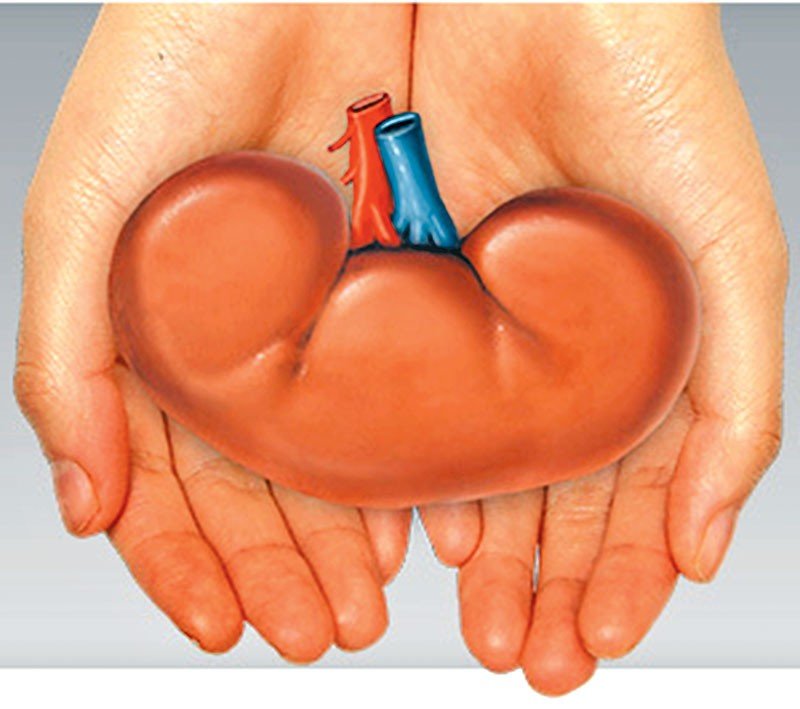Kidney Transplant: What You Need To Know
The kidney transplant operation typically takes three hours. The surgical team will place the donor kidney through a small incision into the patients pelvis, and delicately connect the vein, artery, and ureter.
Typically, only one kidney is transplanted because only one kidney is needed to gain normal function. Surgeons usually do not need to remove the recipient’s diseased kidney.
Most patients stay in the hospital three nights after the transplant surgery. The new kidney usually begins working during this time, although in some cases dialysis is necessary until the transplanted kidney is fully functioning. Patients can typically return to normal, active lives within six weeks of their kidney transplant.
Kidney transplant recipients must take immunosuppressive drugs for the rest of their lives maintain proper weight and blood pressure eat a diet low in cholesterol and sugar forego smoking and alcohol and see their transplant team regularly.
Who Is A Kidney Transplant Candidate
You may be a candidate for a kidney transplant if your physician* has diagnosed you with kidney failure, or end-stage renal disease. This means your kidneys can no longer filter your blood properly. You may already be on dialysis. If you are a good candidate for kidney transplantation, you will be registered with the United Network for Organ Sharing to find a donor kidney.As a kidney candidate, you will get an individual estimated post-transplant survival score. This is a percentage score that ranges from 0 to 100 percent. The score is associated with how long you will likely need a transplanted kidney compared with other candidates. If you have an EPTS score of 20 percent, you are likely to need a kidney longer than 80 percent of other candidates. Someone with an EPTS score of 60 percent will likely need a kidney longer than 40 percent of other people. Your transplant team can calculate your EPTS score for you.Your EPTS is calculated based on factors that affect how long you are likely to need a kidney, including:
- Your age
- Length of time spent on dialysis
- Whether you have received a previous transplant
- If you currently have diabetes
What Should I Eat Or Avoid Eating With A Kidney Transplant
You have more choices about what to eat after you receive a kidney transplant than you would if you were on dialysis. However, you will need to work with a dietitian to develop an eating plan that can change in response to your medicines, test results, weight, and blood pressure.
Read more about kidney failure and eating, diet, and nutrition.
Don’t Miss: Is Cranberry Juice Good For Your Liver And Kidneys
What Are The Possible Problems After A Kidney Transplant
The donated kidney may start working right away or may take up to a few weeks to make urine. If the new kidney doesnt start working right away, youll need dialysis treatments to filter wastes and extra salt and fluid from your body until it starts working.
Other problems following kidney transplant are similar to other pelvic surgeries and may include
- bleeding
- hernia
- pain or numbness along the inner thigh that usually goes away without treatment
Transplant rejection is rare right after surgery and can take days or weeks to occur. Rejection is less common when the new kidney is from a living donor than when its from a deceased donor.
What Are The Different Types Of Kidney Transplants

There are two kinds of kidney transplants depending on who donates the new kidney.
A living-donor transplant is when someone gets a kidney from a person who is still alive and well. It’s usually from a relative or close friend, but sometimes strangers donate.
A is when people donate their kidneys for transplant after they die. This requires people who need kidneys to put their names on a waiting list until a donor is found.
p2
You May Like: Reducose Weight Loss
Is Kidney Transplant Safe
We make sure to always tell our patients that as with any surgery, kidney transplant does involve risks. Youll be required to take medicines called immunosuppressants to help your body accept the new organ.
For many patients, kidney transplantation is an excellent option, even for patients who are usually considered high risk, including:
- Older patients
Who Donates Kidneys For Transplantation
There are two sources for kidney transplants. One is from a living donor, and the other is from a non-living donor. Patients who have had kidneys donated from living donors usually enjoy higher success rates than those who receive organs from non-living donors, since there is less chance for rejection.
A living donor must be in good health and free from diabetes, high blood pressure, cancer, kidney or heart disease. Living donors usually are between 18 and 60 years old. The living donor must undergo a series of tests to determine if they are truly compatible with the recipient. The decision to become a living donor is completely voluntary, and the donor can change his or her mind at any time. Living donors sometimes feel pressure from their families or guilty if they are reluctant to go through with the procedure. They also may feel angry if the recipients body rejects the donated organ. Living donors should discuss their feelings with a transplant professional before making a final decision.
Typically, the donor is admitted to the hospital the day before the kidney donation for all the necessary tests.
There are risks involved in any surgery. All patients have some pain after the operation, and it is possible for donors to develop infections or bleeding. Living donation also may have long-term risks, and its important for both the donor and recipient to know what these are.
Insurance typically covers 100 percent of the donors expenses.
Read Also: Is Cranberry Juice Good For Your Liver
Colorado Woman With Stage
- Leilani Lutali, 56, has been denied a life-saving kidney transplant because she and her potential donor are unvaccinated due to religious reasons
- The University of Colorado Health hospital informed Lutali and her prospective donor, Jaimee Fougner, 45, they had 30 days to get vaccinated
- ‘As a Christian, I can’t support anything that has to do with abortion of babies,’ Lutali said citing the use of stem cell research in some vaccine development
- Pfizer and Moderna used lab-replicated fetal cell lines in their testing stages
- Johnson & Johnson used the cell lines to manufacture and grow the vaccine
- UCHealth said that it is common practice to require vaccines and certain health requirements for organ transplant patients
- Lutali is looking to other states to undergo the procedure
Kdpi Is Based On The Donors:
- Age
Low KDPI
A low KDPI means the kidney is from a donor who was younger and healthier when they died. A kidney with a KDPI score of 20 means it is likely to work longer than most of other donor kidneys. These kidneys typically last 10-15 years.
It may take a long time to get a low KDPI kidney, or you may not get one at all, depending on your place on the wait list.
20-85
A standard criteria kidney has a score of 20-85. These kidneys typically last 10-15 years.
High KDPI
A high KDPI means the donor was older or sicker when they died. These kidneys typically last 7-10 years. They are also called ECD kidneys.
Your transplant center will need your written consent to transplant a kidney with a KDPI of more than 85. A higher KDPI may help you get a kidney sooner.
Recommended Reading: What Std Messes With Your Kidneys
What Are The Side Effects Of Anti
Some anti-rejection medicines may change your appearance. Your face may get fuller, you may gain weight, or you may develop acne or facial hair. Not all people have these side effects.
Anti-rejection medicines weaken your immune system, which can lead to infections. In some people over long periods of time, a weakened immune system can increase their risk of developing cancer. Some anti-rejection medicines cause cataracts, diabetes, extra stomach acid, high blood pressure, and bone disease.
When used over time, these medicines may also cause liver or kidney damage in some people. Your transplant team will order regular tests to monitor the levels of anti-rejection medicines in your blood and to measure your liver and kidney function.
What Are Antibodies And How Does Rejection Occur
Antibodies are proteins your immune system makes when it comes into contact with something foreign to your body. When you get an infection, such as a cold or an infection from a wound, your body makes antibodies to fight that infection. Antibodies protect your body. When you have an organ transplant, your body reacts as it would to an infection. Thus, your antibodies try to destroy the organ. Some people have a lot of antibodies, and it is harder to find an organ match.
Don’t Miss: Is Grape Juice Good For Kidneys
Recovering From The Transplant Surgery
- After the transplant surgery, you will recover in the hospital where you will be watched closely. You will usually spend several days recovering in the hospital.
- In some cases, you may start making your own urine right away. Sometimes, especially with deceased donor kidneys, this will take a bit of time. If your new kidney is not producing urine right away, you will need to stay on dialysis until this starts happening.
- Your transplant team will adjust your immunosuppressant medicines, and watch you closely for signs that your body is accepting the new kidney.
- Usually the transplant team will recommend that you get up and start slowly moving around one day after your surgery.
- Once you have recovered enough to safely go home, you will be released from the hospital and continue recovering at home.
What Else Should I Know

In about 36 months, there’s a good chance you’ll be back to doing most of the things you enjoyed before your kidneys failed. You may have to cut back on rough contact sports, though. Sports like football, hockey and wrestling can lead to injuries that could damage the new kidney.
If you have questions about whether a sport is a good idea for you, talk to your doctor before you start playing. A kidney shield can protect the transplanted kidney and allow you to play some sports.
Ease back into activities while you recover. Eating well, taking your medicines at the correct times, keeping a healthy body weight, and following up with your transplant team will help keep your new kidney healthy.
Don’t Miss: What Std Messes With Your Kidneys
Celebrities And Kidney Transplants
The United States celebrity-fueled social media culture means many celebrities have become increasingly open about their health journeys, sharing personal stories about everything from wellness tips to lifesaving organ donations. Stevie Wonder, who announced to a sea of fans that he would be receiving a kidney transplant from a living donor at the end of 2019, recently updated his fans on his post-transplant progress. While celebrity reputation has no effect on a persons status on the transplant waiting list, an announcement like Steve Wonders reaches his millions of fans with a strong message about the importance of living organ donation. The question is, with about 109,000 people on the organ transplant waiting list in the U.S. how can we use celebrity voices to elevate the conversation about organ transplants and increase the number people both living and deceased who choose to make a lifesaving gift?
How Do I Get A Donor Kidney
If your doctor thinks a transplant is an option for you, theyâll put you in touch with a local transplant center. Thatâs a hospital that does organ transplants. Youâll then have exams, X-rays, and scans to make sure youâre healthy enough to go through the transplant process.
There are two different ways you can get a healthy kidney. The first is through whatâs known as a âliving donor.â This might be a family member or close friend who is willing to give you one of their kidneys. Or, it could be a stranger whoâs willing to give you one of theirs. The second way you could get a kidney is from a deceased organ donor.
Either way, your blood and tissue will need to be tested to make sure yours matches that of the donor. This raises the chances that your immune system will accept the donor kidney and not try to attack it.
If you have a living donor, youâll be able to schedule the date of your transplant surgery. Getting a kidney from a deceased organ donor may take much longer. Youâll be placed on a waiting list. Then, when a kidney is ready, youâll receive a call telling you to get to the hospital right away.
Don’t Miss: What Laxative Is Safe For Kidneys
Why Do Some Patients Wait Longer Than Others For A Transplant
longevity matching
How Do I Know My New Kidney Is Working
Blood tests help you know your donor kidney is working. Before you leave the hospital, youll schedule an appointment at the transplant center to test your blood. The tests show how well your kidneys are removing wastes from your blood.
At first, youll need regular checkups and blood tests at the transplant center or from your doctor. As time goes on, youll have fewer checkups.
Your blood tests may show that your kidney is not removing wastes from your blood as well as it should. You also may have other symptoms that your body is rejecting your donor kidney. If you have these problems, your transplant surgeon or nephrologist may order a kidney biopsy.
Also Check: Do Multivitamins Cause Kidney Stones
Supporting You Through The Kidney Transplant Process
The University of Chicago Medicine’s kidney transplant program is dedicated to offering the highest level of care. Our experts perform both living and deceased donor kidney transplants as well as kidney-pancreas transplants for patients who have Type 1 diabetes and significant kidney disease. We continue to improve transplant medicine through our research, providing patients with access to the newest therapies and treatments.
Can A Transplant Help
When your kidneys have failed, a transplant may also be a good option. Compared to dialysis, a working transplanted kidney does a better job of filtering waste, replacing your failed kidneys, and keeping you healthy.
However, a kidney transplant isn’t for everyone. Anyone interested in a kidney transplant should be evaluated by a transplant center, as some people may not be healthy enough for transplant surgery.
While a transplant is a good treatment for kidney failure, it’s not a cure. You need to take medicines daily so your body doesn’t reject the new kidney. You also need to see your health care professional regularly.
Also Check: Is Ginger Tea Good For Kidneys
Should I Stay On Dialysis Or Have A Kidney Transplant
When your kidneys no longer function properly due to kidney failure, your nephrologist usually offers you 2 options: dialysis or kidney transplant. Many times patients are on dialysis while they wait for transplantation, so its important to understand what that involves.
Our patients sometimes find dialysis to be restrictive, because appointments and maintenance take up a lot of time. Plus, dialysis only replaces part of your kidneys function. Its imperative that your nephrologist monitors you closely alongside your primary care provider to help ensure youre receiving exceptional care.
With a successful kidney transplant, many of our patients are able to live more normally than with dialysis. Thats because life on dialysis means you are dependent on dialysis, which acts as your artificial kidney. With a kidney transplant, life is completely different. In my experience, it can help people get their lives back, and thats truly a gift.
How To Get On A Kidney Transplant Waiting List

If you or your child have chronic kidney disease or kidney failure, you may be eligible for a kidney transplant. Even if you are currently on dialysis, it’s best to get on a waiting list as soon as possible. Thats because people on dialysis do not do as well as people with healthy transplanted kidneys.
Don’t count on your dialysis center to refer you to a transplant center. Unfortunately, in a large proportion of cases, they dont. If you want to get off dialysis and get a new kidney, you have to be proactive.
Also Check: Wine For Kidney Stones
What Should I Expect After My Kidney Transplant
Our patients are generally out of bed and eating the day after their transplant, with the support of our nursing team. We make sure to tell our patients that in addition to their immunosuppressant medicines which theyll take for the rest of their lives they may also receive antibiotics and pain relievers.
My advice is usually this: If youre feeling well and your body is accepting the new organ, you may be released from the hospital within a few days.
In the weeks and months after your procedure, youll have regular check-ups and blood tests to ensure youre healthy and your new kidney is functioning properly.
What To Expect: Support Before During And After Transplant
We try to make evaluation and appointments as thorough and convenient as possible for you and your loved ones. Transplant Surgeons and Nephrologists participate in your transplant evaluation, as well as a Transplant Social worker, Dietician and Coordinator. These experts will work with you from diagnosis through discharge.
Our post-transplant protocols will help you return home as soon as possible after transplant. Our dedicated physicians and providers often continue to care for you for years to come. If you and your physician prefer, we will help your referring physician provide your follow-up care and get any needed answers. Our transplant recipients are part of the UCLA family, and we are available to care for them at any time.
Learn more about our patient education.
Also Check: Flomax Used For Kidney Stones